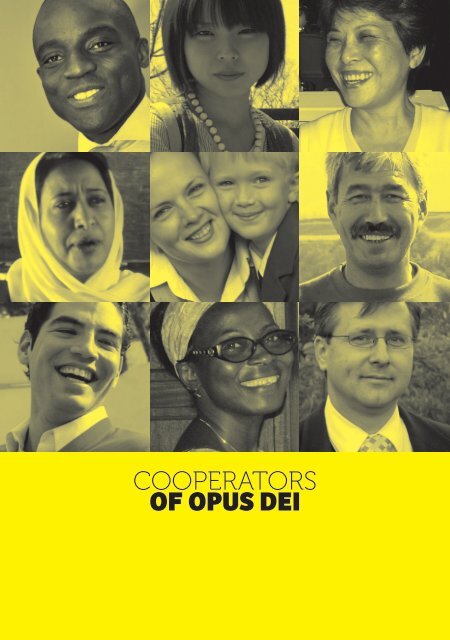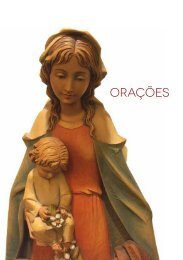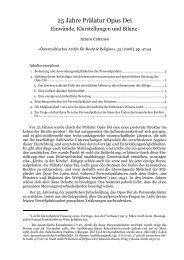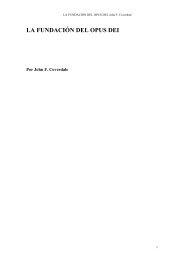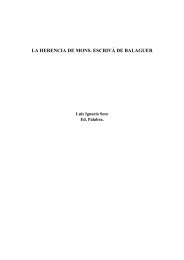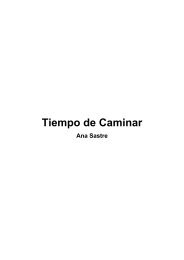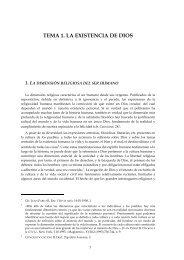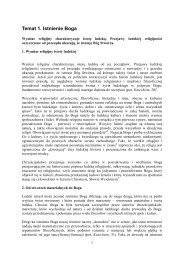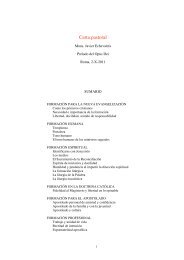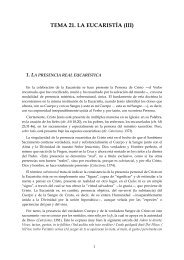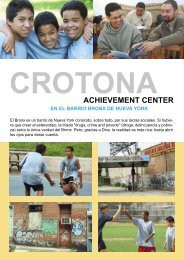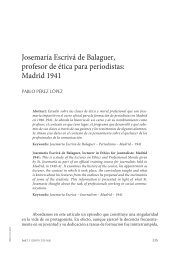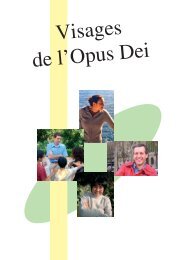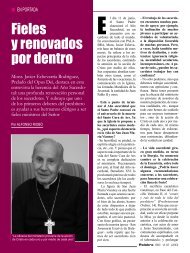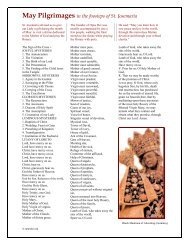here - Opus Dei
here - Opus Dei
here - Opus Dei
Create successful ePaper yourself
Turn your PDF publications into a flip-book with our unique Google optimized e-Paper software.
COOPERATORS<br />
of oPUS DEI<br />
| 1
2 |<br />
CONTENTS<br />
What is <strong>Opus</strong> <strong>Dei</strong>? 4<br />
Cooperators of <strong>Opus</strong> <strong>Dei</strong> 6<br />
The joy of giving 14<br />
An unexpected greatness 22<br />
Friends of God 30<br />
St. Josemaría, a saint close to us 38
In one of the parables of the Gospel, a lighted lamp<br />
symbolises the light of faith expressed in good works<br />
(Matt 25:1-13).<br />
The world will always need men and women who<br />
bring the light of Christ to others, sowing peace and joy<br />
through charitable works. I ask God our Lord that each<br />
of the Cooperators may be a source of concord and<br />
service in society.<br />
Thanks be to God, many educational and social<br />
activities have arisen in countless places with the help<br />
of the members of <strong>Opus</strong> <strong>Dei</strong>, the Cooperators and many<br />
other people of good will. Other initiatives will have to<br />
be studied and brought about in the years ahead with<br />
the aim of serving specific local needs, for the cultural<br />
and spiritual benefit of society.<br />
In praying each day for the Cooperators, as do all<br />
the members of <strong>Opus</strong> <strong>Dei</strong>, I ask God to reward their<br />
generous help and that they may come to an ever<br />
deeper knowledge of the consoling Truth of Christ.<br />
+ Javier Echevarría<br />
Prelate of <strong>Opus</strong> <strong>Dei</strong><br />
| 3
4 |<br />
WHAT IS<br />
OPUS DEI?
Saint Josemaría Escrivá founded <strong>Opus</strong> <strong>Dei</strong>, an<br />
institution of the Catholic Church, on October 2, 1928.<br />
Its complete name is the Prelature of the Holy Cross<br />
and <strong>Opus</strong> <strong>Dei</strong>. It is also called simply <strong>Opus</strong> <strong>Dei</strong>, or “the<br />
Work of God.”<br />
Its purpose is to contribute to the Church’s mission<br />
to evangelize the world, fostering among people of all<br />
sectors of society a life consistent with one’s faith, in<br />
the ordinary circumstances of daily life and especially<br />
through the sanctification of work.<br />
The message <strong>Opus</strong> <strong>Dei</strong> tries to spread is that all honest<br />
human work can give glory to God and be “divinized.”<br />
For St. Josemaría, to sanctify work means to work with<br />
Jesus’ spirit: doing our work conscientiously, seeking<br />
to give glory to God and to serve others, and thus to<br />
contribute to the sanctification of the world.<br />
The Work provides spiritual formation and pastoral<br />
attention to its faithful and to everyone else who wants<br />
it, so that each one, in his or her own place in the<br />
Church and in the world, may get to know and love<br />
God better, giving witness to the faith and striving to<br />
help provide Christian solutions to society’s problems.<br />
The Prelature of <strong>Opus</strong> <strong>Dei</strong> is made up of a Prelate<br />
(Bishop Javier Echevarría) with his clergy, and lay<br />
faithful, both men and women. Many other people also<br />
take part in its activities, and among them many ask to<br />
be Cooperators.<br />
Cooperators of <strong>Opus</strong> <strong>Dei</strong> are men and women who<br />
by their prayer, almsgiving and work help further<br />
the activities organized by the Prelature of <strong>Opus</strong><br />
<strong>Dei</strong>, each according to their specific possibilities.<br />
This brochure offers a few testimonies of how<br />
Cooperators help, and why.<br />
Family of Jean-René Philibert,<br />
Cooperator in Quebec (Canada).<br />
| 5
“In the measure that our eagerness for love and<br />
peace spreads more widely, as a consequence<br />
of the Christian spirit that will bit by bit vivify<br />
all human endeavors, we will help bring about<br />
solutions to the great problems that beset<br />
mankind.”<br />
Men and women of every race, religion and<br />
culture can become Cooperators: Catholics and<br />
non-Catholics, Christians and non-Christians, and<br />
unbelievers as well. Together with the faithful of the<br />
Prelature and many other men and women, they help<br />
further educational and social endeavors all over the<br />
world.<br />
Their cooperation can be both spiritual and also<br />
material. “We need Cooperators like you, who pray;<br />
Cooperators like you, who smile,” St. Josemaría once<br />
6 |<br />
St. Josemaría<br />
COOPERATORS<br />
of oPUS DEI<br />
told a Peruvian village woman when he was in her<br />
country on a trip through Latin America. Material<br />
help can include both work or alms. Referring to<br />
those who share with the faithful of <strong>Opus</strong> <strong>Dei</strong> the<br />
same ideal of human advancement, St. Josemaría<br />
said: “I have so many friends who aren’t Catholics.<br />
They give us a little of what up till then they thought<br />
they needed for themselves; they give it generously<br />
for the apostolic works. They give us their time, and a<br />
portion of their lives.”
Catholic Cooperators, and also many non-Catholics,<br />
appreciate the spiritual and apostolic dimension of<br />
these activities, which are done to serve God, the<br />
Church and all souls. Cooperators include not only<br />
lay people but also clergy from many dioceses all over<br />
the world, and religious communities who cooperate<br />
by their prayer.<br />
Cooperators in turn receive the affection, gratitude<br />
and daily prayer of the Prelate and all the faithful of<br />
<strong>Opus</strong> <strong>Dei</strong>. Moreover, if they so wish, they are offered<br />
Janaiha Faith Nelson, Washington DC (USA)<br />
the possibility of receiving spiritual assistance.<br />
Catholic Cooperators also receive the spiritual<br />
benefits granted by the Catholic Church to those who<br />
assist <strong>Opus</strong> <strong>Dei</strong>’s apostolic work. On specific dates<br />
each year they can obtain indulgences by fulfilling the<br />
conditions established by the Church and renewing,<br />
out of devotion, their desire to be Cooperators.<br />
| 7
CooPERAToRS of oPUS DEI TESTIMONIES<br />
8 |<br />
SHARED IDEALS<br />
Although I received no religious instruction, the singing of the birds and the<br />
beauty of the rivers and mountains of my homeland led me to believe in<br />
the existence of a Creator, and I wanted to get to know more about religion.<br />
One day an <strong>Opus</strong> <strong>Dei</strong> center opened near w<strong>here</strong> I lived. T<strong>here</strong> I could find<br />
information, ask questions, read. And I learned to pray. Within a few years,<br />
though not a Christian, I decided to become a Cooperator, for I shared the<br />
ideals of those who were teaching young people what I would have liked<br />
to learn in my youth: how to get to know God and live a noble life, a life<br />
of work, understanding and respect for others, and healthy entertainment.<br />
After a few years I was baptized. The message of St. Josemaría helps me<br />
sanctify my work, which takes place largely in a garden among the flowers.<br />
When I am watering or fertilizing, I think about how greatly God cares for me,<br />
and when the flowers are opening and blooming, I pray for the spiritual growth<br />
of all men and women.<br />
Yedik Almasbekovich Mamrainov<br />
lives in Almaty, Kazakhstan, and works as a gardener and maintenance man.<br />
RELATIVES AND fRIENDS<br />
I’ve heard that Cooperators are like the relatives and friends of the faithful<br />
of <strong>Opus</strong> <strong>Dei</strong>, and that is exactly what I want to be. In regard to spiritual help,<br />
I benefit from and share in the formation offered by the Prelature, and on my<br />
part, I unite my prayers and other contributions to those of other Cooperators<br />
to help the Work.<br />
Marie Jones<br />
lives in Leatherhead, Surrey, England. She is married and has three children.<br />
GIVING ENCoURAGEMENT To THE SICK<br />
I’ve known <strong>Opus</strong> <strong>Dei</strong> for over thirty years, and became a Cooperator last year.<br />
I’m a social worker and try to give encouragement to the sick. I was diagnosed<br />
with multiple sclerosis in 1991 and was told I had seven years to live. The<br />
illness has worsened over the years and now it is a great effort just to take<br />
a few steps; recently, I lost the ability to read or write. However, despite the<br />
medical prognosis, I have lived almost twenty years since I was diagnosed. I<br />
don’t think I have a vocation to <strong>Opus</strong> <strong>Dei</strong>, but I do feel connected to the<br />
Work, as if I were part of the family. I am greatly helped by the message of<br />
the sanctification of ordinary life. Everything I do, although it may seem trivial,<br />
relates to God and has an infinite value. That seems marvelous to me.<br />
Christoph Flaspöhler<br />
lives in Wachtberg near Bonn, Germany. He is a social worker who previously<br />
worked in banking.
LIKE DANCING<br />
Being a Cooperator is a challenge to me to rise above myself and do all I<br />
can to help support a good cause. Sometimes I am asked to give a dance<br />
workshop, or to organize a family day, or help out with the activities of the<br />
Youth Club, and so on. For several months, I have been giving family counseling<br />
courses to families with children aged between two and ten. I have learned that<br />
believing is not a complex issue, but you do have to delve more deeply into<br />
the faith. When you teach dancing, you have to put your ballet slippers on, and<br />
work on improving your own dancing continually, and I think it’s the same<br />
with the faith. Unless you constantly go deeper and put it into practice, it just<br />
won’t work.<br />
Judith Gerbrands<br />
lives in Kerkrade, Limburg, Netherlands. She is a dance instructor.<br />
fINDING GoD AMoNG THE SHoES<br />
I repair shoes. I came across <strong>Opus</strong> <strong>Dei</strong> thanks to my daughter Agnieszka. She<br />
was the one who told me that I could bring God into my shoe repair work, which<br />
has helped me do my job better. Because of my illness I’ve had to reduce my<br />
professional commitment (three days each week I need to go to the hospital<br />
for dialysis, while waiting to receive a kidney transplant). Above all, I help out<br />
by offering the discomforts of my illness and the dialysis sessions, and the<br />
rosaries I pray while taking the long walks the doctors have prescribed.<br />
Józef Morawski<br />
lives in Warsaw, Poland.<br />
fRoM BASKETBALL To KNoWING GoD BETTER<br />
I came to know about <strong>Opus</strong> <strong>Dei</strong> through a friend who plays basketball. I was<br />
struck by the way she took an interest in the other players, even though they<br />
came from different religions. At first I thought, since I was Orthodox, that<br />
she wouldn’t want to go into deeper matters with me. However, after many<br />
basketball training sessions and conversations, I got to know the spirit of the<br />
Work and, after several years, I asked to be a Cooperator. For me, to be able to<br />
join in this work is wonderful. The thing I appreciate most is being able to<br />
help people to become friends of God, to get to know him better.<br />
Rania Nicolas<br />
lives in Achrafieh, Beirut, Lebanon. She works in banking as a senior<br />
technician.<br />
| 9
CooPERAToRS of oPUS DEI TESTIMONIES<br />
10 |<br />
EVANGELIZING CULTURE<br />
I liked the help I saw being given to young people, including children from poor<br />
families, a formation they often don’t find at home. This strengthens their moral<br />
fiber and helps them overcome the negative pressures from their surroundings.<br />
As a Cooperator, I try to assist this effort as much as possible. My professional<br />
work involves trying to create good quality graphic novels with messages<br />
that encourage a positive vision of the world. I see this work as a small<br />
contribution to help evangelize culture.<br />
Chris Chow<br />
was born in Port of Spain, Trinidad, now lives in Toronto, Canada, and works<br />
as a graphic artist.<br />
A NEW HoRIZoN<br />
I have a congenital disease that causes very painful crises and permanent<br />
anemia. I still haven’t recovered from the last crisis, which left me in a coma<br />
for six days, and I am unable to walk unaided. I offer up these sufferings for the<br />
work of <strong>Opus</strong> <strong>Dei</strong> and for the holy souls in Purgatory. Finding meaning in my<br />
disease opened up a new horizon in my life. At the same time, I have felt<br />
sustained by the prayers of many people, from my family and from <strong>Opus</strong><br />
<strong>Dei</strong>. I’m alive now thanks to those prayers. When I was asked if I wanted to<br />
become a Cooperator, I didn’t hesitate. For me, it means showing gratitude<br />
in some way for the formation that helps me so much to counsel those God<br />
entrusts to me.<br />
Suzanne Ngono Ayissi<br />
lives in Douala, Cameroon, and works as an educational adviser.<br />
IN MY PARISH<br />
Since 2004, a dozen young people from an <strong>Opus</strong> <strong>Dei</strong> residence have taken<br />
part in a social service project in one of my parishes. I help with my prayers<br />
and other contributions, and each year I provide accommodation for these<br />
groups. I attend recollections organized for priests near Montreal, w<strong>here</strong><br />
loyalty to the Pope and the Church’s teachings is stressed, and constant<br />
encouragement is given to balance work and piety, making everything a<br />
prayer to glorify God. Through <strong>Opus</strong> <strong>Dei</strong> my priesthood has been strengthened.<br />
I have also witnessed these young people willingly working eight hours a day.<br />
When they stop or get exhausted, they usually have a book in their hands, since<br />
they don’t want to waste time.<br />
Father Rheal Forest<br />
lives in Manitoba, Canada. He ministers to five Indian reservations within his province.
IN JERUSALEM<br />
I am a Palestinian Arab from Ramallah, a Lutheran Christian married to a Greek<br />
Orthodox. We live in Jerusalem. I was looking for a place w<strong>here</strong> my children<br />
could learn the Christian faith and, with this aim, my son began to participate in<br />
the activities of a center for boys that <strong>Opus</strong> <strong>Dei</strong> has in Jerusalem. My daughter<br />
started to attend the girls’ activities, and then I too started to take part in doctrinal<br />
classes and other activities for women. I wanted to be a Cooperator because<br />
I understood the need for formation in our community and also because I<br />
wanted to spread it among the people of our city, so that it could help them<br />
as much as it helps me. In the days of recollection I’ve found the strength<br />
to continue with my work. (I teach in a primary school w<strong>here</strong> the problems of<br />
today’s world are very much in evidence). I’ve also found the wisdom to reach<br />
positive solutions with my colleagues, along with the creativity to find the right<br />
approach with my students.<br />
Hanada Nijim Noursi<br />
is a school teacher.<br />
PRAYING foR THE WoRK<br />
We don’t yet have an <strong>Opus</strong> <strong>Dei</strong> center in my city, but God will find a path. This<br />
strengthens my responsibility to spread the message of St. Josemaría, which for<br />
me is a duty of gratitude. In recent years, my perception of myself, my family<br />
and my work has changed. Coming home after a hard day’s work and having to<br />
meet the needs of my daughters has become a pleasant experience. In thanks<br />
for all this, I always include the apostolates of <strong>Opus</strong> <strong>Dei</strong> in my prayers.<br />
Sunil Thomas<br />
was born in Kuwait and lives in Bangalore, India. He is married and has two daughters.<br />
He is a marketing director.<br />
A RoSARY A DAY<br />
My sister Pilar and I have been Cooperators for more than fifteen years. Pilar<br />
was a seamstress, but an illness caused her to lose her sight and she had to stop<br />
working. I am working for local families as a home assistant, but for many years<br />
I used to help out with the disabled boys at the Don Orione House. It was t<strong>here</strong><br />
that I met a priest of <strong>Opus</strong> <strong>Dei</strong>. He was the first person to tell me about the Work.<br />
I started attending some talks, while my sister stayed at home. I would explain<br />
to her what I had heard in them afterwards. But we were offered the possibility<br />
of holding the talks at our house, and so she too could attend. Soon these<br />
meetings became Cooperators’ circles. My sister and I give money each month<br />
for the apostolates of <strong>Opus</strong> <strong>Dei</strong>, and we offer many prayers each day.<br />
Alicia and Pilar Martínez<br />
live in Rosario, Argentina.<br />
| 11
CooPERAToRS of oPUS DEI INITIATIVES<br />
Laguna Care Center<br />
MAdrId [SPAIN]<br />
The Laguna Care Center is housed in a modern<br />
three-story building with almost 10,000 square<br />
meters of floor space, situated in the Madrid<br />
district of Lucero. It aims to integrate care for<br />
the elderly with palliative and psycho-geriatric<br />
services.<br />
This project was set up in 2002 by the Vianorte Foundation<br />
to mark the centenary of the birth of St. Josemaría. It is inspired<br />
by the teachings the founder of <strong>Opus</strong> <strong>Dei</strong> passed on through<br />
his life and his writings.<br />
An interdisciplinary team of professionals specializes in<br />
palliative care. Doctors, nurses, social workers, volunteers,<br />
psychologists, physiotherapists, occupational therapists and<br />
the chaplain all work closely together to care for the patients.<br />
This specialized care can be given in the patient’s home, in the<br />
inpatient unit, or in the day-care center, according to the needs<br />
of each patient, their illness and their family circumstances.<br />
12 |<br />
Irtysh Cultural Center<br />
AlMATy [KAZAKHSTAN]<br />
Irtysh was founded in 2007 with aid from<br />
many countries. The main activity of the center<br />
is a language school, meeting a vital need<br />
in Kazakhstan, which is currently involved<br />
in a process of increasing openness and<br />
development. As part of the training program, the<br />
students and others can participate in educational, cultural and<br />
recreational activities aimed at communicating values such as<br />
friendship, respect, tolerance, sporting spirit, generosity, and<br />
openness to spiritual values.<br />
The educational program includes arts and science seminars<br />
in annual cycles, lectures on current affairs, social projects,<br />
excursions, lunches with guest speakers, discussion forums<br />
and cultural trips. Courses in Christian formation and theology<br />
are also available.
Ciudad de Los Niños (Children’s City)<br />
MONTErrEy [MExIcO]<br />
Ciudad de Los Niños is a center for<br />
educational and family development that<br />
provides academic, technical, human and<br />
spiritual support to children and young<br />
people of limited means, together with their<br />
families. It has two sites: the first started in Ciudad<br />
de Guadalupe and the other more recently in the Topo Chico<br />
district of Monterrey. Both of these are deprived areas.<br />
The Family Education Center offers programs for parents,<br />
designed to help them in the task of educating their children.<br />
In addition, various courses help parents without basic<br />
primary or secondary education to acquire needed skills and<br />
improve their work and job prospects.<br />
Terral Social Center<br />
BArcElONA [SPAIN]<br />
The district of Raval, in Barcelona’s old quarter,<br />
has the city’s highest population density. It<br />
also has the highest proportion of immigrants<br />
and the highest levels of unemployment and<br />
school dropout. This neighborhood is the<br />
setting for Terral Social Center, w<strong>here</strong> people<br />
from different cultural and religious backgrounds share daily<br />
classroom resources that help provide job placements and<br />
integration into society.<br />
One of the programs offered is called “1 @ 1.” It is a teaching<br />
method in which each volunteer takes particular responsibility<br />
for a project participant, aiming to facilitate their learning<br />
and progress. People of all ages and walks of life help out in<br />
the program: university students and postgraduates, retired<br />
teachers, housewives and many others. The aim is to help<br />
schoolgirls not to abandon their education before they turn<br />
16, the age at which they can decide whether to enter the<br />
working world or continue with their studies.<br />
| 13
14 |<br />
THE JoY of<br />
GIVING<br />
The faithful of the Prelature of <strong>Opus</strong> <strong>Dei</strong> and the<br />
Cooperators, Catholic or non-Catholic, along with<br />
many others, organize educational, social and cultural<br />
centers all around the world. These centers seek to<br />
help meet the needs of each country or environment,<br />
without discrimination of race, religion or social status.<br />
“You have to engage in a great battle,” St. Josemaría<br />
said, “against want, against ignorance, against disease,<br />
against suffering.”<br />
These projects include universities, vocational<br />
schools, clinics, educational and training centers for<br />
women, student residences, high schools, health-care
centers, etc. They are secular professional initiatives,<br />
with a strong emphasis on caring for people as people.<br />
St. Josemaría insisted that “our spirit is precisely<br />
to encourage initiatives that are built up from the<br />
grassroots; and since the circumstances, needs and<br />
possibilities of each country or social group are usually<br />
“We have to act in such a way that others may<br />
say, seeing us: <strong>here</strong> is a Christian, because he does<br />
not hate, because he knows how to understand,<br />
because he is not a fanatic, because he rises above<br />
his passions, because he sacrifices himself, because<br />
he communicates peace, because he loves.”<br />
St. Josemaría<br />
Work-camp, orphanage Phu My in Ho Chi Min City. Organized by Nairana (Australia)<br />
diverse and specific to each one, the apostolic activities<br />
organized in each country are those that seem best<br />
suited to local needs, whether a university or a student<br />
residence, or a health-care center or farm school for<br />
rural people.”<br />
| 15
THE JoY of GIVING TESTIMONIES<br />
16 |<br />
fREER To MAKE THE WoRLD BETTER<br />
I learned that through prayer, giving example at work, and speaking charitably<br />
w<strong>here</strong>ver I find myself, I can help create a more human environment. Being a<br />
Cooperator has encouraged me to give myself to others, and it has opened<br />
up new possibilities for feeling freer and more duty-bound to work to make<br />
the world better. I try to pass on that experience to others, because it has<br />
increased my awareness of Christ’s love for us, and this leads me to keep trying<br />
to become a saint, despite the falls and setbacks we all face.<br />
José Carlos Neves Epiphanio<br />
is an agronomist and researcher. He lives in São José dos Campos, Brazil.<br />
GIVING A LITTLE SoMETHING BACK<br />
I am the sixth of eight children. I’ve benefitted from <strong>Opus</strong> <strong>Dei</strong>’s Christian formation<br />
activities since childhood. Having received so much, it seemed natural to give a<br />
little something back. Above all I pray and, when my family situation allows it, I<br />
offer financial support as well. With my work, I help an association that raises<br />
funds to provide scholarships to priests and seminarians studying at the<br />
Pontifical University of the Holy Cross in Rome. For me, being a Cooperator<br />
means that, in a sense, I am part of the great family of <strong>Opus</strong> <strong>Dei</strong>. Thanks to the<br />
formation I receive, I try to improve my own life, especially my Christian life,<br />
and also my role as wife and mother.<br />
Marie Kollen<br />
lives in France. She is married and has three children.<br />
foRGIVING<br />
I am a Muslim. A friend gave me a copy of The Way. Reading it made me want<br />
to contribute to the Work. I really liked the idea that I too could help others.<br />
I lend a hand in various activities at the Nerpio Club, in Albacete. I think<br />
this has helped me to get to know the Catholic Church better, and to have<br />
a great appreciation for it. My life has been enriched and the fact that I’m a<br />
Muslim hasn’t been an obstacle. Among many other things, what has struck<br />
me above all is learning to forgive others, something which is far from easy and<br />
which I want to learn to live better.<br />
Habib Moussa Fardoun<br />
was born in Lebanon. He is a Shiite Muslim. He has a degree in Computer Science and<br />
lives in Albacete, Spain, w<strong>here</strong> he is finishing a doctoral thesis at the university.
VEGETABLES foR THE CAMP<br />
When I worked at my grocery store, I used to assist the summer camps for<br />
youngsters. We obtained food for them at a wholesale market. I consider<br />
myself fortunate to be a Cooperator, because St. Josemaría’s message<br />
encourages me to try to work hard and well, to love the Pope and pray for<br />
him, and to turn to our Lady for help. Also, the activities are open to everyone,<br />
whatever their politics or religion, or race or financial situation. When I was sick<br />
I felt the family spirit of <strong>Opus</strong> <strong>Dei</strong>. Every day a doctor who lived in a center of<br />
the Work came to see me, and others from the center also called to see how I<br />
was doing. They brought me a prayer card with a relic of St. Josemaría when I<br />
was unconscious, and from that moment I began to get better.<br />
Manuel Cid Carnero<br />
lives in Montevideo, Uruguay. He is a retired greengrocer.<br />
MY LoVE foR THE CATHoLIC CHURCH<br />
I pray every day for the Prelate of <strong>Opus</strong> <strong>Dei</strong> and the apostolates of the Prelature.<br />
And when possible, my workload permitting, I offer my assistance. For example,<br />
this semester I’ve been happy because my workload has been a bit lighter,<br />
so I’ve been helping on Saturdays in an educational program. Although<br />
I’m not Catholic, my taking part is an expression of my love for the Catholic<br />
Church and is also a contribution to Christian unity. Also, the work is personally<br />
rewarding, as I see how the girls with whom we work are developing. When<br />
they grow, I grow.<br />
Janaiha Faith Nelson<br />
lives in Washington D.C., USA. She is studying for a doctorate at the university.<br />
IMPRoVING THE CoUNTRY BY BEING A BETTER CHRISTIAN<br />
I help out at one of the associations for young professionals at the Niere<br />
Center in Abidjan. This association organizes cultural and sports activities<br />
for young people who are beginning their professional life. Although my<br />
contribution is quite small, for me it is a way to help to do <strong>Opus</strong> <strong>Dei</strong> and to give<br />
thanks for the formation I receive. It also offers me an opportunity to go deeper<br />
in my Christian formation, and to contribute to the good of my country, by<br />
trying to be a better Christian.<br />
Nandjui Djidji Brice Bokra<br />
lives in Abidjan, Ivory Coast. He works in a bank as an internal auditor.<br />
| 17
THE JoY of GIVING TESTIMONIES<br />
18 |<br />
SPIRITUAL BENEfITS<br />
I got to know <strong>Opus</strong> <strong>Dei</strong> through a friend, who invited me to a recollection in<br />
Kimlea. I decided to be a Cooperator because I realized I could assist the work<br />
being done for the less fortunate. I understood that it was my duty to share<br />
with the needy the material resources with which God has blessed me,<br />
and that this would benefit me spiritually. Every day I pray the Rosary for the<br />
apostolates of <strong>Opus</strong> <strong>Dei</strong>, and they are part of my intentions at Holy Mass. I also<br />
contribute with a donation each month and give milk and garden produce to<br />
Kimlea School for cooking classes.<br />
Mary N. Gichuiri<br />
lives in Nyeri, Kenya. She is a retired teacher who now works on a farm.<br />
EVERYTHING I HAVE IS oN LoAN<br />
I am convinced that if God has given me resources, I have the duty to share<br />
them with others. I like the word “cooperate,” because being a Cooperator<br />
goes beyond just helping. For me it is how I respond to God’s love; it means<br />
fulfilling his desires for me. I firmly believe that what I have isn’t mine: it’s on<br />
loan, it belongs to God. So I want to do all I can to help out, with every means<br />
at my disposal, with all that I have and can do. I think this is what God expects<br />
of me.<br />
Miguel Kalbakgi Xikh<br />
was born in Aleppo, Syria, and now lives in Venezuela. He is a salesman.<br />
THE ATMoSPHERE IN MY fAMILY HAS CHANGED<br />
A few years ago, seeking answers to certain questions about the world and the<br />
meaning of life, I began to attend catechism classes in the parish and, through<br />
some people I met t<strong>here</strong>, I contacted an <strong>Opus</strong> <strong>Dei</strong> center. After a while, I was<br />
asked to be a Cooperator. At first I wondered if I could manage it, but finally I<br />
decided to try. I started helping with youth club activities, while also taking<br />
part in classes on Christian doctrine and family issues. These formational<br />
activities have given me new strength and experience to transform my daily life.<br />
I have learned to devote time and effort to making each member of my large<br />
family happier. Truly I can say that, since then, the atmosp<strong>here</strong> in our home has<br />
changed. Now t<strong>here</strong> is a more active concern for one another, and more joy.<br />
Üde Ütt<br />
lives in Tallinn, Estonia. She is a housewife and has six children.
A HEART WoRKING qUIETLY<br />
I am blind. I lost my sight in a car accident. Through the formation I have<br />
received, I have come to realize that marriage is my way of reaching holiness,<br />
by trying to be the best husband and father I can. Also I know that, if I fail, with<br />
God’s grace I can always try again. I have learned to sanctify even the small<br />
skirmishes that each day presents. I have come to realize that the Church is like<br />
a body with arms, legs, head and feet. Maybe I lack the means to have an active<br />
job, which would be the hands and the feet, but everyone can, in their love for<br />
Christ, in their daily prayer and mortification, be the heart that works quietly<br />
but steadily to help give life to the Church.<br />
Jose Maria Ayesa Cacho<br />
lives in Iloilo, the Philippines. He is an entrepreneur,<br />
and works with an NGO that raises funds to support the blind.<br />
WITHoUT DISTINCTIoNS<br />
While helping out with initiatives for the neediest, I began to think: why were<br />
we created? For God, and to help others. When I asked what <strong>Opus</strong> <strong>Dei</strong> means,<br />
and was told, “Work of God,” I said to myself: that’s what I want to do. Whenever<br />
I help in projects aimed at people with limited means, I give thanks to God,<br />
and I realize I should do more to get closer to the Almighty. At the same<br />
time, I ask myself, how can I do more? This has helped me to fulfill my duties<br />
better at home and at work, serving others better. The unity, kindness, spiritual<br />
guidance, humility and diversity of the formation appeals to me very much. No<br />
distinctions are made between Asians or Africans.... All nationalities are united,<br />
and I find this very moving.<br />
Aisha Badamana<br />
lives in Kilimani, Kenya. She is Muslim. She is the director<br />
and proprietor of Little Birds Kindergarten.<br />
fEELING AT HoME<br />
My first contact with <strong>Opus</strong> <strong>Dei</strong> was in Lebanon. I started going to the <strong>Opus</strong><br />
<strong>Dei</strong> center and saw that I could get closer to God. I realized that they had<br />
many needs and tried to help in various ways; then I found out that I could<br />
become a Cooperator. Now I give a monthly contribution and pray daily for<br />
<strong>Opus</strong> <strong>Dei</strong>. It has helped me come closer to God. It has also given a meaningful<br />
channel to the sense of social concern I’ve always had.<br />
Sultani Zegaib Saab Andere<br />
lives in Mexico City. She is a Maronite Rite Catholic and does social work.<br />
| 19
THE JoY of GIVING INITIATIVES<br />
Baytree<br />
lONdON [UK]<br />
Baytree Centre is located in Brixton, an area<br />
of London listed as the seventh poorest in<br />
England, and home to a multiracial community,<br />
with a large refugee population and a high<br />
percentage of unemployment and crime.<br />
This institution aims to fill a gap in the social<br />
fabric, helping the disadvantaged to adapt to society, regardless<br />
of race or social difference. With a staff of 40 people and over<br />
100 volunteers, Baytree gives support, year after year, to more<br />
than a thousand women of various ages from about 100<br />
different countries.<br />
The women who attend the center discover the value of<br />
family life and how to make it compatible with a professional<br />
job outside the home. They learn to read and write, and are<br />
taught basic accounting and computing skills, how to fill in a<br />
form for an interview, how to help their children with school<br />
work, how to understand street signs, etc.<br />
20 |<br />
Seido Foundation<br />
NAGASAKI [JAPAN]<br />
The Seido Language Institute began in 1959<br />
as a small language institute that grew over<br />
the years. In 1971 it was integrated into a larger<br />
educational project, the Seido Foundation for<br />
the Advancement of Education, which was<br />
recognized as an association of public interest.<br />
Now, as then, the main demand is for English classes, since<br />
all Japanese students have to study English for several years<br />
before going to university.<br />
In addition, the Seido Foundation has promoted other<br />
educational initiatives in various parts of Japan, such as<br />
schools in the Nagasaki Prefecture, and residences for teachers<br />
and students in other cities.
Kimlea Technical Training Center<br />
TIGONI [KENyA]<br />
Kimlea, located in the Kiambu District in<br />
Kenya, offers vocational training to women<br />
and girls who have worked in the tea and<br />
coffee plantations of Limuru without having<br />
access to education. Those who cannot<br />
attend regular classes have access to the Kimlea<br />
Outreach Programme, which offers classes in literacy, home<br />
and child care, hygiene, dressmaking, machine sewing, etc.<br />
Kimlea also has a medical clinic that serves about 40<br />
patients each day; it began as a mobile unit and now occupies<br />
its own building. Thanks to the help of Cooperators, who<br />
also contribute to providing food for children, the clinic offers<br />
medicines at very affordable prices. It also provides regular<br />
medical care to twenty primary schools through the Kimlea<br />
CHEP Project (Children’s Health Programme). Each of these<br />
schools has about 1,000 students who, due to their lack of<br />
resources, would otherwise have no access to health services.<br />
Campus Bio-Medico University<br />
rOME [ITAly]<br />
St. Josemaría’s first successor, Bishop Alvaro del<br />
Portillo, encouraged the start of the Campus Bio-<br />
Medico in Rome. Today, it occupies 185 acres,<br />
and includes a state-of-the-art Polyclinic and a<br />
Center for Advanced Research in Biomedicine<br />
and Bioengineering.<br />
The teaching activity offers seven degree courses. The new<br />
Polyclinic, which is organized according to the latest hospital<br />
standards, opened in 2008 at the university campus of Trigoria,<br />
and also includes the Center for Geriatric Health, two Outpatient<br />
Centers and a Radiotherapy Center.<br />
The aim is to provide quality care, a friendly relationship with<br />
patients and a welcoming atmosp<strong>here</strong>. Among the various<br />
research projects undertaken in collaboration with European<br />
companies and universities, the Life-Hand program was recently<br />
launched, through which doctors and biomedical engineers<br />
have managed for the first time to move a bionic prosthetic<br />
hand using brain impulses.<br />
| 21
AN<br />
UNEXPECTED<br />
GREATNESS<br />
Józef Morawski. Warsaw (Poland).<br />
<strong>Opus</strong> <strong>Dei</strong>, founded on October 2, 1928 by St. Josemaría<br />
Escrivá de Balaguer, is a hierarchical institution of the<br />
Catholic Church—specifically, a personal Prelature. Its<br />
aim is to spread, in every environment, the message that<br />
all men and women are called to holiness, that work<br />
and everyday life are opportunities for growing closer<br />
to God, serving others and improving society. T<strong>here</strong> are<br />
currently over 88,000 members of <strong>Opus</strong> <strong>Dei</strong>, priests and<br />
lay people, men and women, from every continent.<br />
A direct consequence of the work of evangelization<br />
done by the faithful of the Prelature is the strengthening<br />
of Christian values in the home, the work place and<br />
society in general. Thanks to God’s grace, this work also<br />
benefits local Churches, through increased participation<br />
22 |<br />
in the Eucharist and the other Sacraments, spreading<br />
the Gospel in places w<strong>here</strong> the faith is not practised,<br />
setting up initiatives to help the disadvantaged, fostering<br />
greater unity with the bishop and the priests of each<br />
diocese, and other fruits.<br />
“Yours is truly a great ideal,” Blessed John Paul II said,<br />
“which anticipated from the outset the theology of the<br />
laity that subsequently characterized the Church of<br />
the Council, and the postconciliar period. This is the<br />
message and spirituality of <strong>Opus</strong> <strong>Dei</strong>: to live united to<br />
God in the middle of the world, in any situation, each<br />
one striving to be better with the help of grace, and<br />
making Jesus Christ known through the testimony of<br />
one’s own life.”
St. Josemaría was chosen by God to proclaim<br />
the universal call to holiness and to indicate that<br />
everyday life and ordinary activities are a path to<br />
sanctification. You could say he was the saint of<br />
the ordinary. Indeed, he was convinced that for<br />
those who live in a faith perspective, everything<br />
offers an opportunity for an encounter with God,<br />
everything becomes a stimulus for prayer. Daily<br />
life, seen thus, reveals an unexpected greatness.<br />
Holiness is truly available to everyone.<br />
Blessed John Paul II<br />
Without trying to draw up an exhaustive list, the<br />
following are some of the characteristic features of the<br />
spirit of <strong>Opus</strong> <strong>Dei</strong>: seeing the reality of being sons and<br />
daughters of God as the foundation of one’s spiritual life;<br />
love for Jesus Christ, who is present in the Church, and<br />
meeting him in the Eucharist and in the Word; a desire<br />
to make the Mass the center and root of Christian life<br />
in the world; love for our Lady; docility to the Pope and<br />
the Church’s hierarchy; charity and a desire to get along<br />
with others in a spirit of understanding; the joy that<br />
comes from following Christ closely; unity of life, uniting<br />
the various aspects of daily life in an integral way with<br />
one’s faith; the importance of professional work, carried<br />
out as well as possible, with love for God and a spirit of<br />
service; love for freedom and personal responsibility.<br />
Living the Catholic faith in an integral way carries<br />
with it a real concern to contribute, as far as possible,<br />
to solving the problems we see in the world around us.<br />
St. Josemaría wrote that “a Christian cannot be satisfied<br />
with working only to provide for himself and his family.<br />
His greatness of heart will spur him to do all he can to<br />
support others, motivated by charity, and also by justice.”<br />
Members and Cooperators of <strong>Opus</strong> <strong>Dei</strong> feel equally<br />
committed to striving to respond to this challenge.<br />
| 23
AN UNEXPECTED GREATNESS TESTIMONIES<br />
24 |<br />
SEEING CHRIST IN THE SICK<br />
I met <strong>Opus</strong> <strong>Dei</strong> 20 years ago, while studying medicine. I was given some advice<br />
that has become the driving force for my work in a busy hospital, and which I<br />
have tried to implement ever since: to treat each patient as if he were Jesus<br />
Christ. I also try to help the dying to reflect on their lives and, if they wish, to<br />
receive a visit from one of the hospital chaplains.<br />
Peter Stevens<br />
lives in Sydney, Australia, with his wife and six children. He works in a rehabilitation<br />
hospital.<br />
A GREAT DISCoVERY<br />
Odette, a friend of mine, told me about an <strong>Opus</strong> <strong>Dei</strong> center. Over time, my<br />
life has changed. I have found the true faith, and a few months ago I became<br />
a Catholic. Knowing that I can offer each of my actions to our Lord was a<br />
wonderful discovery in my life; it lifts me up and helps me to overcome the<br />
sorrows that life brings. The formation I receive helps me to improve my<br />
family life and my relationship with friends. I try to realize the importance of<br />
working for the glory of God, and I see that this bears fruit.<br />
Marie Louise Nya Finké<br />
lives in Yaoundé, Cameroon. She teaches at a technical institute.<br />
THE SAME PERSoN IN ALL AREAS of MY LIfE<br />
My son was starting university in London and moved to Netherhall House.<br />
That was how I came into contact with <strong>Opus</strong> <strong>Dei</strong>. The formative activities<br />
have strengthened my awareness of being a son of God and helped me to<br />
struggle to attain personal holiness in daily life. I was especially drawn to the<br />
idea that I can (and must) be the same person in all areas of my life; not<br />
compartmentalized, depending on w<strong>here</strong> I am and who I am with.<br />
John Devlin<br />
lives in Ipswich, Suffolk, England. He works as a development manager.
MoTHERS’ NETWoRK<br />
When I was fifteen, I attended a recollection for young people. I was very<br />
surprised to hear of the possibility of being a good Christian in the midst of<br />
the world. I found out about the Mikawa Cooking School, in Nagasaki, and<br />
decided to study t<strong>here</strong>. T<strong>here</strong> I found an atmosp<strong>here</strong> of respect for freedom<br />
and a practical Christian training, adapted to my circumstances. Later,<br />
along with some former students of Mikawa and several friends, we started a<br />
website on the internet, w<strong>here</strong> we talk about issues related to educating our<br />
children. It is still small, but I have a dream of starting an association, mothers<br />
of Mikawa, to help women with young children.<br />
Sakura Kawaguchi<br />
lives in Nagasaki, Japan. She works as a cook.<br />
REfLECTING CHRIST<br />
I am studying Institutional Communication at the University of the Holy Cross,<br />
w<strong>here</strong> I met <strong>Opus</strong> <strong>Dei</strong>. As a Cooperator I try to pray for the Work and spread its<br />
message. I also try to give a small donation to the Centro Romano di Incontri<br />
Sacerdotali (the Roman Center for Priestly Meetings). My collaboration is also<br />
a response to the help I receive through spiritual direction, circles, monthly<br />
recollections and retreats, which have deepened my awareness of what it<br />
means to be a priest. For example, the recommendation to wear a cassock is<br />
a good reminder that the way I dress should reflect “the heart and life of a<br />
priest, that is to say, of Christ.”<br />
Robert Bellarmin Sisi<br />
is a priest in the Diocese of Idiofa, Democratic Republic of the Congo.<br />
“CoffEE PAINTING”<br />
Through the formation I receive, I’ve learned to love my profession as a painter,<br />
because a job well done gives glory to God, and helps one to practice virtue. For<br />
example, I learned to speak with God when I’m alone working on a painting,<br />
and perhaps having difficulty concentrating. When my work becomes more<br />
difficult, I think of someone, perhaps the future owner of the painting, and I<br />
offer up each mark or stroke of the brush. That way I can ensure that all my<br />
painting is done with love and prayer.<br />
Sunshine Plata<br />
lives in Marikina City, Philippines. She is a “coffee painter”,<br />
an artist who paints pictures with coffee.<br />
| 25
AN UNEXPECTED GREATNESS TESTIMONIES<br />
26 |<br />
BELIEVING IN oRDER To SEE<br />
Since I became a Cooperator, I surprise myself each time I am able to find a<br />
supernatural meaning in things that might at first glance seem trivial. With my<br />
eyes fixed on God, I see things differently, which gives my life a completely<br />
new meaning. I’ve learned that you don’t need to see in order to believe, but<br />
rather you need to decide, freely, to believe in order to see. This perspective<br />
changes your life. Life ceases to be a monotonous passage through this world,<br />
and becomes a marvelous adventure.<br />
Juan Pablo Valencia Montero<br />
was born in Santiago, Chile. He now lives in Almaty, Kazakhstan,<br />
and works in advertising.<br />
WITH MY PATIENTS<br />
I work as a physical therapist for people with Alzheimer’s and children who are<br />
disabled, autistic or suffering from psychotic disorders, in the 3 to 8 age group.<br />
I try to give them exercises that will help them regain some balance. Since I<br />
became a Cooperator, I have tried to entrust these children and elderly people<br />
to God. In the morning, I offer up my day and pray for them. At night, I entrust<br />
all the day’s events to our Lord. I’ve learned that every moment, everything I<br />
do, is an opportunity to get closer to Christ.<br />
Aude Durroux<br />
lives in Paris, France.<br />
GoD IN MUSIC<br />
Music has always been my priority. I wanted to be famous, to excel and stand<br />
out. But the classes of Christian formation I attend have convinced me that the<br />
most important thing is to do things out of love for God and others. It’s the same<br />
with my job as the host of a television program. The fact that I appear on the<br />
screen is no longer what’s important; rather, my goal is to enable many people,<br />
through the program, to discover the wonders of music. Now I understand that<br />
if you know why you do things, for what purpose, life is much more exciting. I<br />
know that I can offer Jesus my work, and that everything has meaning and is<br />
worth the effort, when it’s done out of love for God.<br />
Arturo García Lourdes<br />
lives in Mexico City. He hosts a classical music television program.
ACCEPTING GoD’S WILL<br />
I became a Cooperator because I wanted to stop being defensive in the way I<br />
lived my faith. Through the teaching on the universal call to holiness, I realized<br />
that being holy is not about doing great things with your own strength, but<br />
about abandoning yourself to God’s will, and then it is God who acts. Then<br />
one understands that life is not lived on one’s own. Being a Cooperator has<br />
helped me see that besides asking God for what we need, as though making<br />
demands on him, he is the one who acts when we open our hearts to him.<br />
Masao Horikawa<br />
lives in Nagasaki, Japan, and runs his own osteopathic clinic.<br />
EMPHASIS oN fREEDoM<br />
For me, being a Cooperator is a way to grow in my Catholic faith and take<br />
part in the new evangelization of society. I assist with my prayer and financial<br />
contributions. I do it gladly, for the love I have for the faithful of the Prelature,<br />
and because I am convinced of the need to bring people to God.<br />
I’m a judge and I love my job. I try to do it according to Christian principles and<br />
the teachings of St. Josemaría regarding respect for the dignity of each person.<br />
What especially appeals to me is the emphasis on freedom in civic and<br />
professional life. Through the Christian formation I receive, I gain the strength<br />
to begin again and again every day, striving for the faithfulness that God wants<br />
from me.<br />
Guadalupe Quijano<br />
lives in Campeche, Mexico. She is President of the High Court<br />
in the State of Campeche.<br />
MoRE THAN A CoffEE SHoP<br />
I was a fervent Buddhist when I was introduced to <strong>Opus</strong> <strong>Dei</strong> by my eldest<br />
daughter. She told me about a student residence that was opening in Taipei. I<br />
wanted to help with this project and I became a Cooperator. By the grace of<br />
God, my husband and I were baptized at Easter 2008. Now when I invite a<br />
friend to become a Cooperator, I know I’m offering her the opportunity to get<br />
closer to God. Another thing that has changed is my coffee shop, the Café Paris.<br />
I’ve been running it for forty years and have made many friends over the years,<br />
and many of those who have been <strong>here</strong> have come closer to God in one way<br />
or another.<br />
Huang-Chun Chen<br />
lives in Penghu, Taiwan. She owns a coffee shop.<br />
| 27
AN UNEXPECTED GREATNESS INITIATIVES<br />
Center for Applied Medical Research (CIMA),<br />
University of Navarra<br />
PAMPlONA [SPAIN]<br />
In 2002, as a result of fifty years of research<br />
experience in the Faculty of Medicine and the<br />
University Clinic, the Center for Applied Medical<br />
Research was established at the University of<br />
Navarra. It currently employs over 400 people<br />
from some twenty countries. Researchers concur<br />
in emphasizing that one of the advantages of this center has<br />
been the impetus for multidisciplinary work, so important in<br />
science, and the spirit of service that it seeks to embody.<br />
During its first few years, the Center has had more than 40<br />
new discoveries patented in different areas of research: gene<br />
therapy and hepatology, cardiovascular sciences, neuroscience<br />
and oncology. These areas of medicine encompass the study<br />
of diseases that cause 90% of deaths in some parts of the<br />
world.<br />
28 |<br />
Center for the Integral Development of<br />
Women (CEFIM)<br />
lA PAZ [BOlIVIA]<br />
The CEFIM professional training institute in La<br />
Paz is aimed at young women across Bolivia.<br />
In this country’s culture, levels of education<br />
among women are lower than those of men.<br />
CEFIM emerged as a force for change, to assist<br />
in the technical training of women and<br />
help them access jobs and professions. At the same time, it<br />
responds to the high demand for technical expertise in the<br />
manufacturing and service industries.<br />
This is the first educational center that has been granted<br />
official status as a Vocational and Alternative Institute of Higher<br />
Education. It carries out its mission through a personalized<br />
education based on Christian principles and ethics. Thanks<br />
to international cooperation, as well as many Bolivian<br />
contributors, in July 2009 it opened up a new center, including<br />
classrooms and workshops, which can accommodate 300<br />
students. In addition to vocational courses in care for the elderly,<br />
hospitality and catering, it provides professional cooking and<br />
pastry-making courses, the Accelerated Baccalaureate and<br />
other short courses that are open to the general public.
Nocedal Technical and Professional School<br />
SANTIAGO dE cHIlE [cHIlE]<br />
Since 1996, Nocedal has provided education<br />
to boys from El Castillo, a municipality in the<br />
district of La Pintada which is among the<br />
poorest and most deprived in Santiago de<br />
Chile. People living t<strong>here</strong> have little hope of<br />
improving their living standards, and many young<br />
people are forced to give up their studies and go to work to<br />
provide for their families.<br />
With the support of those who believe in the Nocedal<br />
project, about 1000 students have received high-quality<br />
education with Christian values, and have found hope for a<br />
better future. Their success demonstrates that everyone is<br />
capable of benefiting from a broad-based and well-founded<br />
human and professional education.<br />
Higher Institute of Nursing (ISSI)<br />
KINSHASA [cONGO]<br />
In 1998 the Institut Supérieur en Sciences<br />
Infirmières was opened, located in a suburb<br />
of Kinshasa. The institute seeks to impart<br />
an awareness of the role and responsibility<br />
of nursing personnel in the Congolese<br />
community. The students learn to do their job<br />
professionally. Beyond the goal of merely earning a salary,<br />
they learn to see their work as a personal service to patients,<br />
doctors, families, etc.<br />
The teaching system is based on close mentoring,<br />
accompanying each student through every step of their<br />
training. In addition to classes, students receive on the job<br />
training in various hospitals in Kinshasa. Refresher courses<br />
and seminars are also offered to health personnel from other<br />
hospitals.<br />
The tuition paid by students covers half the cost of their<br />
training, and t<strong>here</strong> are scholarships for those without sufficient<br />
financial resources. When they finish, t<strong>here</strong> are plenty of jobs<br />
in the capital and elsew<strong>here</strong> in the country for these nurses,<br />
who are appreciated for their professionalism and their<br />
personalized, humane treatment of patients.<br />
| 29
To carry out its pastoral work in the service of the<br />
Catholic Church, the Prelature of <strong>Opus</strong> <strong>Dei</strong> organizes<br />
activities for Christian and human formation aimed<br />
at people from all walks of life. In a practical way that<br />
is tailored to each one’s individual circumstances,<br />
encouragement is given to love and follow Jesus<br />
30 |<br />
FRIENDS<br />
of GoD<br />
Christ, to get to know him better, amid one’s daily tasks.<br />
People are helped to grasp more deeply the riches of<br />
the Catholic faith and the joy of living in accord with<br />
the Gospel and one’s baptismal promises.<br />
A central place is given to the message of the<br />
sanctification of work: that is, the effort to do it as
Detail of The Last Supper, Giotto.<br />
perfectly as possible, with full respect for ethical<br />
principles, seeking union with God in each task, and<br />
striving to serve others and contribute to the progress<br />
of society.<br />
In short, the aim is to encourage people to develop<br />
all their human and supernatural potential, and put it<br />
The main activity of <strong>Opus</strong> <strong>Dei</strong> is to provide its<br />
members, and others who desire them, the spiritual<br />
means necessary to live as good Christians in the<br />
midst of the world.<br />
St. Josemaría<br />
in the service of God and neighbor. Thus they will be<br />
Catholics who seek to be true to the demands of their<br />
faith, and exemplary citizens, free and consistent in<br />
their professional, family and social life.<br />
| 31
fRIENDS of GoD TESTIMONIES<br />
32 |<br />
SINCE MY CoNVERSIoN<br />
In the summer of 2009 I was received into the Catholic Church, and soon after<br />
I became a Cooperator. This has helped me grow in my spiritual life and given<br />
me the opportunity to remind those I meet that we are all called to holiness,<br />
precisely in the performance of our work and ordinary duties, at all times of the<br />
day: through our work, family life and social relations. This spirit has given me<br />
a more harmonious and a fuller life.<br />
Marcus Litzberg<br />
lives in Sweden.<br />
fINDING GoD IN SUffERING<br />
I work in the intensive care unit of a hospital. I’ve seen that sometimes suffering<br />
is an obstacle to understanding God’s love. I’ve seen many patients who are<br />
frustrated by their illness, or who have lost their inner peace when nearing<br />
death. In these cases I try to talk with them about faith and hope in God, and<br />
often they return to the sacraments. They discover in suffering, which at first<br />
seemed an obstacle, an opportunity to find happiness, to grow in their love<br />
for God, and to seek his forgiveness.<br />
Ciara Mannion<br />
lives in Galway, Ireland. She is a nurse.<br />
A SCARCE CoMMoDITY<br />
St. Josemaría’s message struck me as very logical and practical: to give<br />
significance to every day, every minute, and live them in a holy way. It’s a<br />
way to follow Christ without strange or complicated procedures. I help <strong>Opus</strong><br />
<strong>Dei</strong> through my prayers and some financial contributions. I attend some means<br />
of formation, but more importantly, I’ve begun to really try to live according to<br />
my faith. It’s not easy, certainly, but it’s possible.<br />
Rokas Masiulis<br />
lives in Vilnius, Lithuania. He is a businessman.
WAITING foR A CENTER<br />
When I was little, I went several times to a youth club run by members of <strong>Opus</strong><br />
<strong>Dei</strong>, with all sorts of amusing activities and a friendly atmosp<strong>here</strong>. Many years<br />
later, married and living in Norway, I met a member of <strong>Opus</strong> <strong>Dei</strong> who came<br />
from Stockholm to Oslo from time to time to try to start regular recollections<br />
<strong>here</strong>. I immediately saw in her the positive and cheerful spirit so characteristic<br />
of Catholics. It was only natural that I should support her in every way I could<br />
right from the start. As t<strong>here</strong> is no center of <strong>Opus</strong> <strong>Dei</strong> in Norway yet, this friend<br />
stays with me when she comes to Oslo for the monthly recollections, and<br />
I try to invite people to come to them.<br />
Isabel Hidalgo<br />
lives in Oslo, Norway. She is a representative of the Family Policy Institute of Norway.<br />
STEEL WRAPPED IN VELVET<br />
For various reasons, I was in need of inner strengthening. While browsing<br />
the internet, I happened to visit the <strong>Opus</strong> <strong>Dei</strong> website, and it immediately<br />
interested me; they talked about something I needed. I contacted them and<br />
went to a retreat. It greatly enriched me and made me reflect on the spirit of<br />
humility, truthfulness, the effort to pass unnoticed.... On the need to be like<br />
steel inside, but on the outside wrapped in velvet. I see the message of St.<br />
Josemaría, which is both modern and attractive, as though he had made it<br />
for me, for my life in the middle of the world. My cooperation takes the form<br />
of helping out in some specific small things, as needed. For example, I help<br />
organize each month the day of recollection in Martin. For me this is a great<br />
joy.<br />
Miroslav Mazuch<br />
lives in Martin, Slovakia. He is a judge. He is married with four children.<br />
offERING MY ILLNESS<br />
From the start, I knew that my illness would be an opportunity to draw closer<br />
to God, and I arranged things so that I could continue attending circles and<br />
Christian doctrine talks. I’ve learned to offer the sickness to God for various<br />
intentions. And I have many: the members of my family, the Holy Father,<br />
the Prelate of <strong>Opus</strong> <strong>Dei</strong>. Offering my illness keeps me going. Rather than<br />
focusing on the constant suffering, I try to be happy.<br />
Chikaodili Rosemary Nnoli<br />
lives in Lagos, Nigeria.<br />
| 33
fRIENDS of GoD TESTIMONIES<br />
34 |<br />
THE DETAILS No oNE SEES<br />
I received Baptism and Confirmation when I was young, but didn’t have a<br />
deep understanding of the faith. A friend invited me to attend the monthly<br />
recollections and, little by little, I discovered the reasons behind the faith. I work<br />
in a garage. I paint many vehicles that have been repaired after an accident and,<br />
as I’m working on each one, I ask God for some particular intention. I often<br />
work on parts of the car that are not seen but, since I try to offer my work as a<br />
prayer, I pay great attention to detail in these areas. Learning how to apply the<br />
Catholic faith in a practical way and teaching others to do so is something<br />
I find really attractive, and it helps me deepen my relationship with Christ.<br />
Gavin Dixon<br />
was born in Sligo, Ireland, and lives in Dublin.<br />
NEVER Too LATE<br />
My conversion took years to finally come to completion. Until then I had<br />
lived believing myself to be on the right road, but with a God made to my<br />
measure. Through friends I little by little learned what Christian life means. In<br />
2008, a friend in <strong>Opus</strong> <strong>Dei</strong> helped me to prepare for my First Communion and<br />
Confirmation, making it possible for me to receive weekly classes given for<br />
me personally. When I was invited to become a Cooperator, I thought it only<br />
right to help actively, and I prayed that many people like myself might also<br />
benefit. For me it’s been a gift from God and a marvelous opportunity to help<br />
to do God’s work. Since I received my First Communion at 37 years of age,<br />
I can say that it’s never too late to find true happiness.<br />
Patricia Lafuente<br />
lives in Asuncion, Paraguay. She is a journalist.<br />
THE RoAD To CoNVERSIoN<br />
To be a Cooperator had been for me a clear road to conversion, giving me<br />
the inner joy of knowing that I am truly a son of God. It has opened my<br />
mind and heart to the wonderful experience of being for a few minutes each<br />
day in direct contact with our Lord. Not one day now goes by without a brief<br />
visit to the Blessed Sacrament, and if I don’t have time to accompany our Lord<br />
for a short while in prayer, I really miss it. The occasional free afternoons I have<br />
from my work I now dedicate to my family. Thanks to St. Josemaría I came to<br />
understand the importance, and the beauty, of helping my wife in the work of<br />
bringing up our six children.<br />
Giuseppe Messina<br />
lives and works in Palermo, Italy. He is an architect.
fooD foR MY SoUL<br />
For me, being a Cooperator means trying to improve my life, particularly<br />
in spiritual matters. The formation I receive is food for my soul. I find very<br />
attractive St. Josemaría’s central idea that all of us can and should become<br />
saints through our daily lives, taking many small steps each day. And we are<br />
generously offered the spiritual support we need.<br />
Susanne Ruzsics<br />
lives in Kilchberg, near Zurich, Switzerland.<br />
A CHANCE oCCURRENCE<br />
I work as a bookbinder. Some copies of The Way, The Forge, Friends of God and<br />
other works of St. Josemaría chanced to come into my hands. And while I was<br />
restoring them, their contents became a kind of seed growing inside me. Often<br />
friends come to my workshop and tell me their problems. Maybe I can’t give<br />
them a solution but I can point them in the right direction. So, paradoxically,<br />
my “battle station” is my bookbinding workshop, always guarded by a picture of<br />
St. Josemaría. My friends often go away with some good advice from this saint.<br />
Juan Carlos Bordolli<br />
lives in Montevideo, Uruguay. He binds and restores books.<br />
fRoM CURIoSITY To HAPPINESS<br />
I was born on the outskirts of St. Petersburg. My parents were teachers. They were<br />
good and honest people but, like the majority of people who grew up in the Soviet<br />
Union, they didn’t talk to their children about God. In my first contact with the faith<br />
what most attracted me was the trust I felt for people who professed their faith<br />
in Jesus Christ, but my internal world changed little. For me, God was just one<br />
more item, whom I remembered only when faced with some difficulty. Everything<br />
changed in 2007 when the girl who looked after my son began taking him to the<br />
Catholic church of St. John the Evangelist in Pushkin. Curious, I soon went along<br />
too. Mass gave me a happiness I hadn’t experienced since childhood. In 2008, some<br />
people from the <strong>Opus</strong> <strong>Dei</strong> center in Moscow began holding recollections in our<br />
parish. In the monthly recollections and reading the works of St. Josemaría,<br />
I learned that being a Christian doesn’t mean only an hour’s visit to God<br />
on Sundays, but living constantly in the presence of God. This year I’ve left<br />
my post in a prestigious company to work at the White Stone publishing house,<br />
which started as an initiative of two priests and publishes and distributes religious<br />
books in Russian. My new company is smaller, but the challenge is much more<br />
interesting. Even though difficulties may arise, I have the conviction that God is<br />
stronger than any obstacle.<br />
Natasha Zubova<br />
lives in St. Petersburg, Russia. She works in publishing.<br />
| 35
fRIENDS of GoD INITIATIVES<br />
Niger Foundation Hospital<br />
ENUGU [NIGErIA]<br />
The Niger Foundation Hospital, located in<br />
Enugu, has as its aim to improve the health of<br />
people in southeast Nigeria. For many years,<br />
this part of the country has faced serious<br />
health problems, including high levels of<br />
infection, and lack of medical centers and trained<br />
staff.<br />
The project began in 1993 in temporary buildings. In its first<br />
year of operation more than 10,000 patients were treated and<br />
this number increased year by year. The increase in the number<br />
of patients made it obvious that bigger and more adequate<br />
facilities were needed. With this aim a fund raising campaign<br />
began in 1996, which was received with enthusiasm and<br />
supported both by local benefactors and foreign institutions.<br />
Gradually the new facilities became a reality. At present<br />
the hospital provides primary and secondary health services<br />
in, among other areas, internal medicine, general surgery,<br />
gynecology, obstetrics, orthopedics, urology, radiology and<br />
physiotherapy.<br />
36 |<br />
Campus Muengersdorf<br />
cOlOGNE [GErMANy]<br />
Campus Muengersdorf in Germany embraces<br />
three different university institutions inspired<br />
by Christian principles: the International<br />
College, the Domestic Management Center<br />
and the Conference Center.<br />
The first provides student accommodation<br />
and promotes cultural formation. It offers the possibility of<br />
intellectual exchanges between different fields of knowledge<br />
and is a place w<strong>here</strong> teachers and students can meet.<br />
The Domestic Management Center is a professional<br />
training center for students in catering and home economics.<br />
It emphasizes team work, the importance of each person,<br />
efficient use of time and management organization and<br />
flexibility. These values, together with the technical training<br />
provided, meet the requirements demanded by the service<br />
and human resources professions.<br />
Through conferences, get-togethers and seminars open<br />
to the general public, the Conference Center, which is also<br />
part of the Campus Muengersdorf, offers the opportunity to<br />
reflect on current affairs and provides a setting for dialogue<br />
with teachers and experts from the world of economics,<br />
theology, art, music, etc.
Harambee: “All together for Africa”<br />
The Harambee Africa International<br />
association was born at the time of the<br />
canonization of St. Josemaría. Since 2002 it has<br />
organized educational initiatives in sub-Saharan<br />
Africa and activities of communication and awareness in the<br />
rest of the world.<br />
In its first decade, thanks to donations from thousands of<br />
people, Harambee has supported 33 projects (schools, teacher<br />
training programs and other social activities) in Angola,<br />
Burkina Faso, Cameroon, the Democratic Republic of the<br />
Congo, Guinea Bissau, the Ivory Coast, Kenya, Madagascar,<br />
Mozambique, Nigeria, Rwanda, Sierra Leone, South Africa,<br />
Sudan and Uganda.<br />
Inspired by the message of St. Josemaría, Harambee seeks<br />
not just to build buildings, but also to have a positive impact on<br />
the life of African teachers.<br />
At present the Association is established in Italy, France,<br />
Spain, Portugal, Holland, Ireland and the United States. (www.<br />
harambee-africa.org).<br />
Pedreira Educational and Welfare Center<br />
(CEAP)<br />
SÃO PAUlO [BrAZIl]<br />
The CEAP, or Pedreira Educational and<br />
Welfare Center, started in 1985 and is the fruit<br />
of an ideal shared by some professionals and<br />
students. The center seeks to improve social<br />
conditions in the district of Pedreira in the<br />
south of São Paulo, w<strong>here</strong> young people and<br />
adolescents between 10 and 18 years of age are at serious risk<br />
of marginalization, drugs and juvenile delinquency. Over these<br />
years CEAP has received 22 awards and is widely recognized<br />
for its work in this field.<br />
CEAP offers basic training courses in Household and<br />
Industrial Electricity, Information Technology Assistance,<br />
Data Processing and Telecommunications, in addition to a<br />
two year course in Administration. 95% of its graduates have<br />
obtained employment on finishing their studies, and some 4%<br />
have reached management posts or have set up their own<br />
businesses. Students trained in CEAP are working in more than<br />
400 companies.<br />
The work of CEAP extends to the families of the students<br />
through programs such as “Child and Family Education” and<br />
“Adolescent and Family Formation.” In addition, every year<br />
over 500 families receive medical and dental treatment.<br />
| 37
SAINT<br />
JoSEMARÍA<br />
A SAINT<br />
CLOSE TO US<br />
St. Josemaría Escrivá de Balaguer was born on<br />
January 9, 1902 in Barbastro, Spain, in a Christian<br />
family. He was not spared suffering even at an early<br />
age; in less than four years his three younger sisters<br />
died and the family business was ruined. Nevertheless,<br />
these events did not cause him to lose his joy or his<br />
confidence in God.<br />
On March 28, 1925, at 23 years of age, he was<br />
ordained to the priesthood in Saragossa. He offered his<br />
first Mass for the soul of his father, who had died four<br />
38 |<br />
months earlier. From that day his life was centered on<br />
the celebration of the Eucharist, from which he gained<br />
strength for all his pastoral activities.<br />
In the spring of 1927 he moved to Madrid. He carried<br />
out extensive priestly work in a charitable institution<br />
for the poor and destitute. Amid this constant giving<br />
of himself to God and those around him, God made<br />
him see <strong>Opus</strong> <strong>Dei</strong> on October 2, 1928, while he was<br />
spending some days on a spiritual retreat.
The Book of Exodus (33:11) tells us that God spoke<br />
with Moses “face to face, as a friend speaks with<br />
a friend.” I think that, even if the veil of discretion<br />
hides many details from us, we can very well<br />
apply these words to Josemaría Escrivá, “speaking<br />
as a friend speaks with a friend,” which opens the<br />
doors of the world to God to act and transform<br />
everything.<br />
Cardinal Joseph Ratzinger<br />
Gathering in Castelldaura (Barcelona, Spain) in 1972.<br />
In 1946 St. Josemaría moved to Rome, in keeping<br />
with the worldwide scope of <strong>Opus</strong> <strong>Dei</strong> and also as a<br />
manifestation of his union with the Pope. From the<br />
eternal city he worked with all his heart in the service<br />
of the Church he loved so deeply and encouraged the<br />
expansion of the apostolate of <strong>Opus</strong> <strong>Dei</strong> throughout<br />
the world.<br />
He died at midday on June 26, 1975. On October<br />
6, 2002, he was canonized by Pope John Paul II. His<br />
remains are venerated in the Prelature’s church of Our<br />
Lady of Peace in Rome.<br />
From the day of his death accounts of favors granted<br />
through his intercession began to arrive at the seat<br />
of the Prelature of <strong>Opus</strong> <strong>Dei</strong> in Rome: conversions,<br />
decisions to deepen in the practice the Christian faith,<br />
cures, material favors.... His life and teachings are an<br />
inspiration and help for hundreds of thousands of<br />
people who trust in his intercession, as a friend they<br />
can approach to strengthen their faith.<br />
| 39
ST. JoSEMARÍA, A SAINT CLoSE To US TESTIMONIES<br />
40 |<br />
LIKE A GAS STATIoN<br />
I was born and grew up in a part of Germany with a Lutheran tradition. On April<br />
19, 2005, my uncle mentioned to me that a German had just been elected Pope<br />
and, out of curiosity, since I had never been interested in Catholicism, I turned<br />
on the television. From that moment on, I couldn’t stop thinking about what the<br />
Pope had said and I began reflecting on the faith and the Church. I bought the<br />
Catechism of the Catholic Church and rapidly found answers to questions that<br />
had always unsettled me. One day, looking at the website of a big publisher, a<br />
book entitled The Way drew my attention. On reading it I knew that my place<br />
was in the Catholic Church. I contacted the local parish and in 2007 received the<br />
sacrament of Confirmation. I bought more books by St. Josemaría and obtained<br />
information about <strong>Opus</strong> <strong>Dei</strong> via the internet. I found out about a public launch<br />
of a biography of St. Josemaría that was to take place in Cologne, and decided<br />
to go t<strong>here</strong> with my father. Afterwards I started to attend various activities<br />
of formation. I saw that they enriched my life, particularly the recollections.<br />
For me, they are like a gas station w<strong>here</strong> I can go to recharge my soul so as<br />
to go forward in daily life. I soon felt the need to do more for <strong>Opus</strong> <strong>Dei</strong>, and<br />
after talking it over with the friends I had made t<strong>here</strong> I decided to become a<br />
Cooperator.<br />
Christian Wilke lives in Falkenstein, Germany. He is a nurse who works in a prison.<br />
EVERYTHING WITH A SMILE<br />
Ever since I began to attend some means of formation, I’ve often felt I was<br />
“consuming” goods constantly and giving nothing back in return. Now, as a<br />
Cooperator, I can make a contribution, but above all I receive help to sanctify<br />
my daily life and do everything with a smile. I find it challenging to be faithful<br />
to prayer, and put order into my daily life: getting up, praying, looking after the<br />
children at school, shopping, doing housework, tackling piles of dirty clothes,<br />
cooking.... I’ve learned how to set priorities and work in a more orderly way.<br />
One of the most important things I’ve learned is how to discover God in my<br />
neighbor, in the people around me, in those who are suffering and are in need,<br />
and also in the beauty and happiness of a relationship. By meditating on<br />
the message of St. Josemaría I’ve discovered how a person liberated from<br />
their selfishness becomes freer and more generous, able to provide human<br />
richness to relationships with others.<br />
Maria Spenger lives in Graz, Austria. She is a kindergarten teacher.<br />
I’M THE fIRST To BENEfIT<br />
It may sound a bit selfish, but as I see it I myself am the first to benefit from being<br />
a Cooperator. My life makes almost no sense without doing apostolate, or feeling<br />
I’m part of the Work. I often find myself repeating phrases or anecdotes of St.<br />
Josemaría. T<strong>here</strong> are two aspects of his spirit that I find especially attractive:<br />
courage to face challenges that appear beyond our reach and accepting<br />
things that we don’t like; and the confidence that comes from realizing we<br />
are in God’s hands, that we are nothing without him, but that with him we<br />
can take on endeavors that are beyond our strength. These two characteristics<br />
come down to one, which is the most important one: prayer, union with God.<br />
Alejandro Emilio Canale Becker lives in Buenos Aires, Argentina. He works in the<br />
community home “El Encuentro” and for the Mapfre Foundation.
WITHoUT EXPECTING ANYTHING IN RETURN<br />
St. Josemaría has had a great impact on my life. His example of serving without<br />
expecting anything in return moved me to become a promoter of Condoray,<br />
a corporate activity of <strong>Opus</strong> <strong>Dei</strong>. So I devote my energies to helping people<br />
to grow humanly and spiritually and to develop. In addition St. Josemaría has<br />
granted me many favors. For example, Naomi, my daughter, was born thanks<br />
to a favor of St. Josemaría. Some doctors recommended abortion as a result<br />
of my health problems, but my family and I prayed for a miracle through his<br />
intercession, and God granted it. I had to sign a document that cleared the<br />
doctors of any responsibility for what might happen to me. But Naomi came<br />
into the world. Another gift is my son who arrived when I was getting on in age.<br />
As thanks for so many favors, he bears the name Josemaría.<br />
Raquel Morán lives in Peru. She is a housewife and has five children.<br />
PHRASES WRITTEN foR ME<br />
A few months before defending my doctoral thesis, I discovered the Christian<br />
faith. Subsequently I obtained two jobs, both quite good, but I realized something<br />
was missing. I can do greater and more interesting things, I thought. Looking<br />
for a way out of this cul de sac, I found on the internet some quotations of<br />
St. Josemaría. They were short paragraphs but they caught my attention and<br />
spurred me to take action. Those phrases seemed to have been written just<br />
for me. When I learned to find God in my daily life, my relationship with<br />
my work changed. The quality improved and I was more demanding on<br />
myself because I realized why I was doing it. Now it is impossible for me to<br />
be slapdash or to finish a task merely to remove it from my “to do list,” because,<br />
above all, it’s work done for God.<br />
Sergei Biziukhin lives in Riazan, Russia. He is Orthodox and works as a historian.<br />
IN A RELIGIoUS CoNGREGATIoN<br />
In 1985 I was fortunate to meet Monsignor Alvaro del Portillo, the first successor of<br />
St. Josemaría. He became a real father to me and a very valuable adviser. He helped<br />
me a lot in the decisive years of our juridical path. In the years following the Council,<br />
the Work gave me a lot of support to keep true to our wish to follow faithfully<br />
the doctrine of the Church and our religious observance. Seeing how much we<br />
benefited from the spiritual assistance of <strong>Opus</strong> <strong>Dei</strong>, it seemed to me that the best<br />
way of responding and giving thanks was in our formal commitment to pray for the<br />
Work. Since then each Community that has been founded has asked to be named a<br />
Cooperator of <strong>Opus</strong> <strong>Dei</strong>. Our cooperation consists mainly in prayer. Every day we<br />
offer our lives for the sanctification of priests, and in our prayers the apostolic<br />
work of <strong>Opus</strong> <strong>Dei</strong> is especially present. For me this cooperation signifies above all<br />
supporting a work of God in the Church and receiving its spiritual benefits. Though<br />
the orientation of the Work is very different from our life as consecrated religious, we<br />
are all seeking the holiness to which God calls us, and it is very important that we<br />
support one another on this path, respecting the variety of our particular charisms.<br />
Mother María Jesús Velarde lives in the convent of the Daughters of Holy Mary<br />
of the Heart of Jesus in Galapagar, Spain. She is the Founder<br />
and Superior General of this Institute of Pontifical Rite.<br />
| 41
ST. JoSEMARÍA, A SAINT CLoSE To US TESTIMONIES<br />
42 |<br />
fRoM THE KITCHEN<br />
I decided to become a Cooperator on seeing how generously St. Josemaría<br />
gave himself to God and the family spirit he spread. I often think that it is thanks<br />
to the “yes” he gave to our Lord that we are all <strong>here</strong>. Since then my family life and<br />
my work have completely changed. When I see two hundred people eating in<br />
a restaurant, I pray for them and see it as a direct way of connecting them with<br />
God. When I prepare a special dish, I ask God to inspire me to make it well so<br />
that it satisfies the people’s needs, and I say to him: This is for you.<br />
Juan Pedro Espinosa Sánchez<br />
lives in Murcia, Spain. He is a caterer and<br />
President of the Association of Chefs in the Region of Murcia..<br />
WAITING IN VIETNAM<br />
The first thing I knew about <strong>Opus</strong> <strong>Dei</strong> was The Way, the book by its founder.<br />
My parish priest gave it to me. Its message that I can be a saint through my<br />
work really touched my heart. This book became my spiritual guide during my<br />
years at the university. In 1997 I began attending monthly talks and circles in<br />
Ho Chi Minh City and I became a Cooperator. At the beginning t<strong>here</strong> were five<br />
of us who attended the means of formation. Now we are thirty. We helped to<br />
translate the material for the classes on Christian doctrine into Vietnamese, and<br />
also help provide simultaneous translations during the recollections and other<br />
activities. I always pray for the Work and hope it will soon be able to begin<br />
its stable work in Vietnam.<br />
Pham Kim Uyen<br />
lives in Tan Bien, Vietnam. She works in a Human Resources department.<br />
IN THE CINEMA AND THEATER<br />
We actors often face problems of conscience and we need fortitude to live<br />
up to the faith; rejecting a project with immoral content can mean losing<br />
the opportunity to get other work in the future. I try to put myself in St.<br />
Josemaría’s hands when I have to insist on changes in the script of a film,<br />
and at times I’ve achieved great improvements. I also take advantage of the<br />
long rehearsals during plays to talk to my colleagues about the meaning of life,<br />
the family, successes and failures in life....<br />
Adam Woronowicz<br />
lives in Warsaw, Poland. He is a cinema and theater actor.
fINDING THE RIGHT PATH<br />
I converted to Catholicism in April 2005, having followed the last days of the<br />
life of John Paul II on television, and something happened inside me that I<br />
can’t describe: a sorrow, a longing for God, a need to find the right path<br />
once more, which became so strong and clear that I immediately began<br />
my fantastic return voyage to the faith. One day, in the Catholic Cathedral<br />
of Stockholm, I was introduced to a priest who talked to me about <strong>Opus</strong> <strong>Dei</strong>.<br />
I began going to a Center w<strong>here</strong> I attended recollections, meditations, Mass....<br />
St. Josemaría’s message has made me grow a lot as a person, woman, mother,<br />
daughter, friend. My life has taken on new meaning since I learned that holiness<br />
is within everyone’s reach and that we can help other people through our work.<br />
Caroline Israelsson<br />
lives in Stockholm, Sweden. She is an interior designer.<br />
BEYoND UToPIA<br />
During the Soviet period, even though it was forbidden to talk about religion, my<br />
colleagues and I had the intuition that human work has a divine dimension. St.<br />
Josemaría’s message of seeking sanctity through work is of great importance<br />
in our society. Work that is well done is key not only to personal development<br />
but also for the whole of humanity because it brings people together. St.<br />
Josemaría has taught us that every Christian must do his work as perfectly as<br />
possible, since only work done in that way can be offered to God and become<br />
a path of purification and sanctification. This is what allows us to become cocreators<br />
with God.<br />
Yuri Simonov<br />
lives in Moscow, Russia. He is professor of theoretical physics<br />
and director of a nuclear physics laboratory.<br />
EVERY SCHooLGIRL IS A TREASURE<br />
I learned about the Nagasaki Seido School four years after it was established. I<br />
liked the oratory because, although I’m not a Christian, I studied in a Catholic<br />
school and every morning went t<strong>here</strong> to pray before classes. Nagasaki Seido<br />
attracted me through its friendly family environment and by the way the<br />
teachers treated the schoolgirls. I right away wanted to help them in their work.<br />
The message of St. Josemaría has made me see each of my schoolgirls as a<br />
treasure and has moved me to help them, respecting their personalities so<br />
that in the future they can be useful in society. I give thanks that my two boys<br />
were able to study in Seido. Now they are grown up, and they bear engraved on<br />
their hearts the school motto: Freedom and responsibility: possumus! We can!<br />
It moves me to see them, when taking on any challenge, whether big or small,<br />
saying: possumus!<br />
Mitsuko Hori<br />
lives in Nagasaki, Japan. She is receiving instruction for Baptism.<br />
| 43
ST. JoSEMARÍA, A SAINT CLoSE To US INITIATIVES<br />
Pontifical University of the Holy Cross<br />
rOME [ITAly]<br />
Initiated by Monsignor Alvaro del Portillo,<br />
following a long-desired dream of St.<br />
Josemaría, the university began its activities<br />
in 1984, with the firm support of John Paul<br />
II. At present around 1500 students—priests<br />
and candidates to the priesthood, religious and<br />
lay people, men and women—from more than 70 countries<br />
study t<strong>here</strong>. Classes are offered in the faculties of Theology,<br />
Philosophy, Canon Law and Church Communications, and in<br />
the Institute of Religious Studies. Its location in Rome helps to<br />
highlight the service to the universal Church that is intrinsic to<br />
<strong>Opus</strong> <strong>Dei</strong>’s apostolic work.<br />
The work of the University is supported by the contributions<br />
of benefactors from all over the world, people of diverse<br />
religious beliefs and financial capabilities.<br />
44 |<br />
Kenthurst Study Center<br />
SydNEy [AUSTrAlIA]<br />
Kenthurst Study Center on the outskirts of<br />
Sydney offers a variety of academic, cultural<br />
and spiritual activities. It was built with<br />
contributions from many people throughout<br />
the country who continue helping with their<br />
donations. Courses held in recent years have<br />
included Lights and Shadows, a series of conferences run<br />
by Creston College for women professionals and students.<br />
Seminars on topics such as post-modernism, business ethics,<br />
the social doctrine of the Catholic Church, the family and<br />
fashion have also been organized.<br />
During the year Kenthurst offers many spiritual retreats for<br />
people from every background. T<strong>here</strong> are also seminars for<br />
bishops and diocesan clergy on topics of current interest. In<br />
2008 Benedict XVI spent some days at Kenthurst praying and<br />
resting before the Sydney World Youth Day.<br />
The services Kenthurst offers are carried out by qualified<br />
and expert staff who seek to create a family atmosp<strong>here</strong> in<br />
the meals provided and in the care of the center. Kenthurst<br />
also offers students from Kenvale College who are studying<br />
Hospitality Management the opportunity to practise their skills.
CooPERAToRS of oPUS DEI IN BrIEF<br />
1<br />
2<br />
3<br />
4<br />
What is a Cooperator of <strong>Opus</strong> <strong>Dei</strong>?<br />
Cooperators are men and women who, without forming part of the Prelature of <strong>Opus</strong> <strong>Dei</strong>, help its<br />
apostolates in various ways.<br />
To be a Cooperator does not require a specific vocation. Cooperators usually are relatives, friends or<br />
colleagues of the Prelature’s faithful; or persons who have received some spiritual benefit from the<br />
apostolate of <strong>Opus</strong> <strong>Dei</strong> or who appreciate the great task of human and social development that is<br />
carried out by the different apostolic endeavors of the Work. Cooperators can be non-Catholics, non-<br />
Christians or persons who profess no religion at all.<br />
What is involved in being a Cooperator of <strong>Opus</strong> <strong>Dei</strong>?<br />
Cooperators commit themselves to collaborate spiritually or materially with the apostolic initiatives of<br />
<strong>Opus</strong> <strong>Dei</strong>. Spiritual help may take the form of prayer, daily if possible, for <strong>Opus</strong> <strong>Dei</strong> and its apostolates.<br />
Material help consists in collaborating by means of one’s work in some apostolic work of the Prelature<br />
or by means of financial contributions. In addition, those who wish to do so participate in the means<br />
of Christian formation that the Prelature offers.<br />
What benefits do Cooperators receive?<br />
The faithful of <strong>Opus</strong> <strong>Dei</strong> pray daily for all who help or have helped the Prelature in any<br />
way. In addition, on certain occasions the priests of the Prelature offer Mass for the<br />
souls of deceased Cooperators. Moreover, the Holy See has granted indulgences that<br />
Cooperators can gain on particular days of the year, by observing the conditions established<br />
by the Church and renewing, out of devotion, their commitments as Cooperators.<br />
How does one become a Cooperator of <strong>Opus</strong> <strong>Dei</strong>?<br />
The Regional Vicar of <strong>Opus</strong> <strong>Dei</strong> appoints as a Cooperator a person who desires this, by means of a<br />
proposal from a faithful of the Prelature. Once the proposal has been approved, the person is informed;<br />
he or she becomes a Cooperator on the date on which the appointment is communicated. That day<br />
a Catholic Cooperator can gain a plenary indulgence, under the usual conditions.<br />
| 45
“You are the ones who do everything, and it’s the<br />
same everyw<strong>here</strong>. You are wonderful. You know<br />
how to respond to God, how to please him and<br />
give your help, so that we can save souls. May God<br />
bless you. Thank you! Thank you! Thank you!”<br />
46 |<br />
St. Josemaría
| 47
Information Office of <strong>Opus</strong> <strong>Dei</strong> 2012<br />
330 Riverside Drive<br />
New York, NY 10025<br />
(212) 532-3570<br />
info@opusdei.org<br />
www.opusdei.org<br />
48 |


